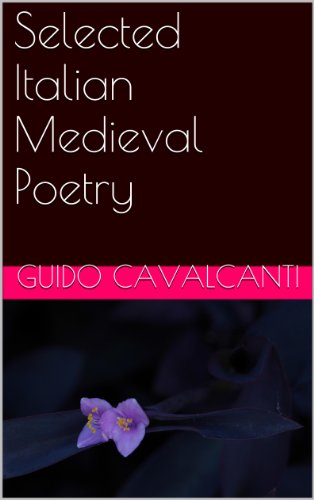Background
Guido Cavalcanti was born in Florence about 1255, the son of a wealthy Guelf.



(Selected Italian Medieval Poetry Guido Cavalcanti, Chiaro...)
Selected Italian Medieval Poetry Guido Cavalcanti, Chiaro Davanzati, Cino Da Pistoia, Dino Frescobaldi, Guido Guinizelli, Guido Novello da Polenta, and Dante
http://www.amazon.com/gp/product/B004U34LTE/?tag=2022091-20

(The fact that Cavlacanti's friend, Dante Alighieri, was a...)
The fact that Cavlacanti's friend, Dante Alighieri, was a supremely fine poet ought not blind us to Cavalcanti's own, rather different excellence. Both men were attracted to the dolce stil nuovo, the ""sweet new style"" that emerged in thirteenth-century Florence. While Dante's poetry was devoted to his childhood sweetheart, Beatrice, Cavalcanti's poetry had more the tang of real-world experience: he struggled against unruly passions and sought instead to overcome love - a source of torment and despair. It is chiefly through the translations of Rossetti and Pound that English-speaking readers have encountered Cavalcanti's work. Pound's famous translation, now viewed by some as antiquated, is remarkably different from the translation provided here in the graceful voice of poet David Slavitt. Working under the significant restraints of Cavalcanti's elaborate formal structures, Slavitt renders an English translation faithful to the original poetry in both rhyme and rhythm.
http://www.amazon.com/gp/product/1926836847/?tag=2022091-20

(Guido Cavalcanti (c. 1250-1300) of Florence was one of th...)
Guido Cavalcanti (c. 1250-1300) of Florence was one of the first to create a new style of poetry, the "dolce stil nuovo," that was to inspire Dante. Cavalcanti's poetry sings of relationship and the metaphors of love that transcend the sexual and the romantic. Cirigliano's sensitive and probing text breaks with the Victorianisms of Rossetti's and Pound's translations in offering the contemporary reader the full passion of this master in a verse that is both elegant and direct. Includes introduction, notes, and first-line index. Dual-language poetry.
http://www.amazon.com/gp/product/0934977275/?tag=2022091-20
Guido Cavalcanti was born in Florence about 1255, the son of a wealthy Guelf.
Cavalcanti studied under the philosopher and scholar Brunetto Latini, who earlier had been the teacher of Dante.
In 1284 Cavalcanti was a member of the General Council of the commune.
While Cavalcanti was on a pilgrimage to Santiago de Compostela - a trip which took him to Toulouse, where he met a young woman, Mandetta, to whom he wrote two poems, and to Nîmes but not beyond - it is said that Corso Donati, the leader of the Black Guelfs of Florence, attempted to have him assassinated. Cavalcanti tried in vain to avenge himself by spurring his horse against Corso in a Florentine street and throwing a dart. A general fight ensued, involving also the Cerchi, leaders of the White Guelfs, whom Cavalcanti supported. On June 24, 1300, the priors of Florence (Dante among them) exiled some of the leaders of both factions, and Cavalcantri went to Sarzana with other followers of the Cerchi. His ballad of farewell, Perch'i' no spero di tornar giammai, a masterpiece of grace and tenderness, could have been written during this exile.
He returned to Florence 2 months later, mortally ill. His death was recorded on August 29, 1300, in the church of S. Reparata.
The poems which can be attributed positively to Cavalcanti are 36 sonnets, 11 ballads, 2 canzoni, 2 isolated stanzas, and 1 motet. Almost all his poetry is concerned with love. In his famous canzone Donna me prega . .. , he develops his theory of love within an elaborate poetic structure and in complex philosophical terms. The themes of fright and death predominate in Cavalcanti. Cavalcanti incorporated into his poetic language a term from scholastic philosophy, "spirit" (spirito or spiritello), to indicate the various movements of the heart and the human faculties. The spirits become poetic personages by which Cavalcanti dramatically represents the psychology of the lover.
(Selected Italian Medieval Poetry Guido Cavalcanti, Chiaro...)
(The fact that Cavlacanti's friend, Dante Alighieri, was a...)
(Guido Cavalcanti (c. 1250-1300) of Florence was one of th...)
Original in Cavalcanti is his concept of love as a cruel, overpowering force with a violent potentiality for destruction. Love is a dark passion of the senses which arises from the contemplation of an image of ideal beauty abstracted by the possible intellect at the sight of a beautiful woman. From such love, death often result - a true state of death, in which the mind is destroyed and the poet moves about like an automation.
Contemporary chroniclers portray Cavalcanti as a disdainful, solitary, studious man, courtly and daring, and a good philosopher. His fiery temperament is evident in his animosity toward Corso Donati, the leader of the Black Guelfs of Florence.
In 1267 the boy Guido was married to Bice, the daughter of the Ghibelline leader Farinata degli Uberti, possibly in a peacemaking attempt between the Guelfs and the Ghibellines. Guido was one of the Guelf guarantors of a peace concluded between the two factions in 1280.
